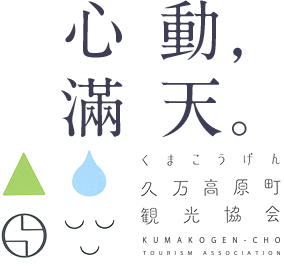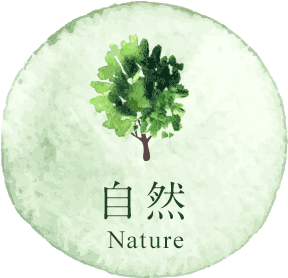

Welcome to Kumakogen
The town of Kumakogen-cho is also known by the nickname "the Karuizawa of Shikoku"—Karuizawa being a well-known and luxurious mountain resort in Nagano Prefecture. Kumakogen is home to Mount Ishizuchi, Western Japan's highest mountain; the Shikoku Karst Region (one of the country's top three karst regions, which are topographies characterized by limestone eroded into unique forms by rainwater); Omogo-kei Gorge, located at the headwaters of the Niyodogawa River which boasts Japan's most pristine waters; and other natural splendors that are considered some of the nation's most impressive.
With an average elevation of 800 meters (2,625 feet), the town offers a cool climate and different natural attractions throughout the four seasons, including spring flowers, cool places to escape the summer heat, fiery leaves in autumn and skiing during winter.
We hope this website will help you learn more about Kumakogen. Come and visit us soon!
Hand-picked by Local Citizens!
Kumakogen's Top Five Attractions

Natural scenery, unique products, local cuisine and more! The following are some of Kumakogen's most appealing aspects, impressive attractions and points of pride, all hand-picked by local citizens.
Four Seasons That Can Be Enjoyed with All Five Senses
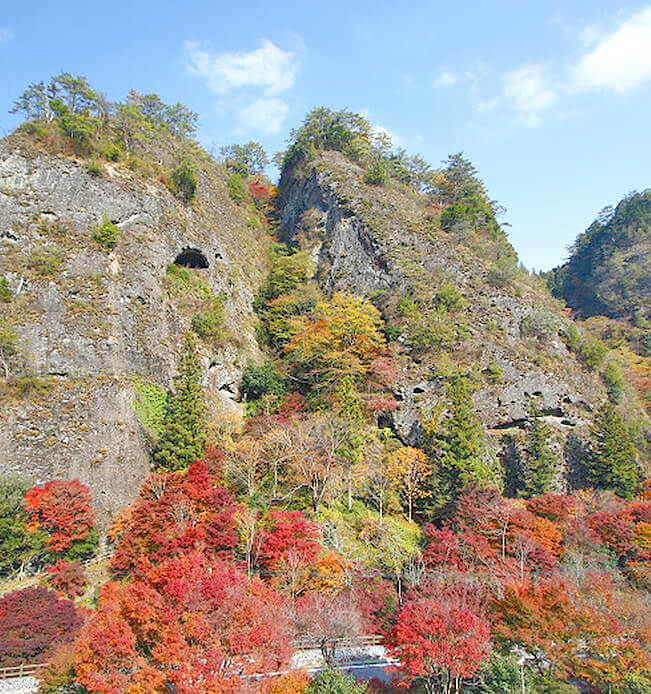
Kumakogen's four seasons have unique characteristics that set them sharply apart from one another, so visitors can enjoy distinctive and changing scenery throughout the year. This includes seasonal flowers, trees and plants; leisure activities such as river-swimming and skiing; and even nighttime attractions such as views of the Milky Way during the summer.
-
- Spring
- Cherry blossoms and peach blossoms
-
- Summer
- River swimming/leisure, early-summer greenery, and Milky Way night views
-
- Autumn
- Colorful autumn leaves
-
- Winter
- Snowy scenery and winter sports

Breathtaking Scenes from Mother Nature
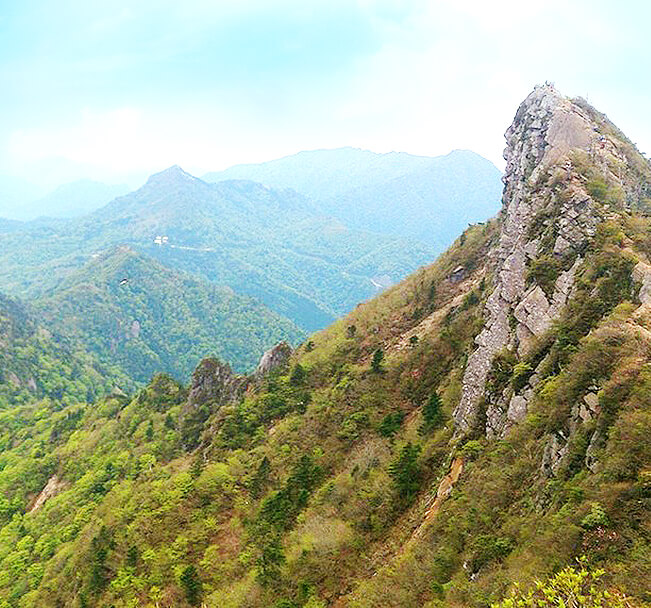
Enjoy stunning mountain scenery with relatively easy mountain-climbing trails, encompassing Mount Ishizuchi (Western Japan's highest peak), the Shikoku Karst Region, the Okawamine Mountains and more.
Mount Ishizuchi is particularly popular among tourists as a "power spot," which refers to a spiritual, natural spot believed to refresh and heal visitors. If you're not up for mountain climbing, it's possible to enjoy the area's mountain scenery by car along the Ishizuchi Skyline route.
The Shikoku Karst Region is considered to be one of Japan's three largest karst regions and provides some outstanding, unparalleled vistas. This scenery can be viewed from the Shikoku Karst Highland Road by car or on foot along the local walking trails, and it's a great place for camping in the summer as well.
Last but not least, the Okawamine Mountains form smooth, flowing lines with their interconnected peaks. Here, visitors can savor fresh spring greenery, view multitudes of early-summer rhododendrons in bloom, see the winter pampas grass fields, and enjoy other seasonal treats.

Omogo-kei Gorge
Omogo-kei Gorge boasts refreshing cool temperatures in the summer and beautiful, fiery leaves, reflecting off clear waters in autumn. The area has many things to see, which is why we recommend taking time to explore at a leisurely pace before moving on.
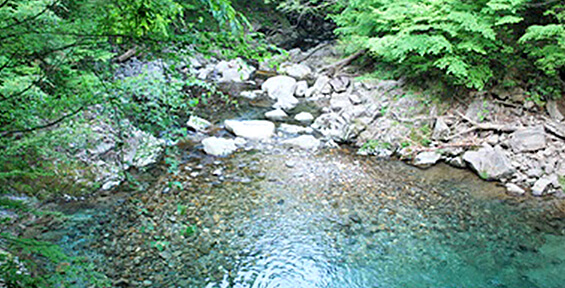
Low-priced,
Delicious Vegetables
Kumakogen's daikon radishes, potatoes and other vegetables are packed with delicious flavor. The local tomatoes are particularly famous, and they are often used to make juices, ketchups and other such products.
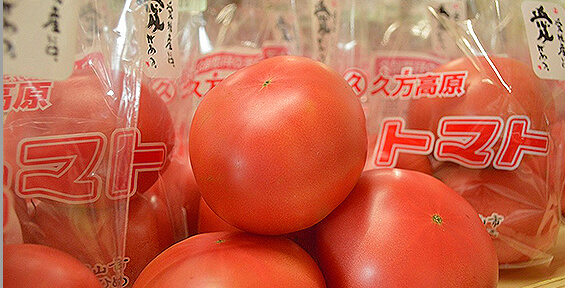
Kuma Lumber
Japanese cedar, the town tree in Kumakogen, is used to make high-quality Kuma lumber. This wood is used to build model homes, and local high school students even utilize it to make musical instruments, furniture and more.
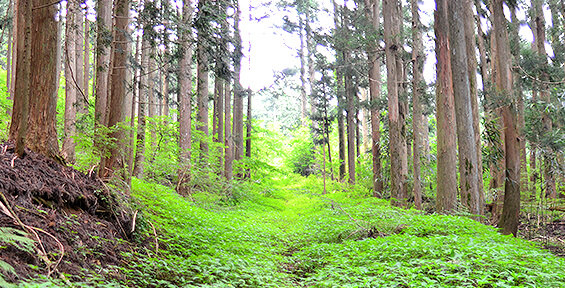
Overview of Kumakogen
Kumakogen-cho is a rural highland town with an average elevation of 800 meters (2,625 feet), filled with impressive natural scenery and surprises around every corner. Located about 50 minutes by car from Matsuyama City, the urban center of Ehime Prefecture, Kumakogen is a popular destination for those looking to escape the summer heat or just enjoy some leisure activities.
Each of the town's various areas, including Yanadani (home to the Shikoku Karst Region), Omogo (location of Mount Ishizuchi), Mikawa, and Kuma offer unique and widely varied natural attractions. Kumakogen is also home to temples of the Shikoku 88-temple Pilgrimage, nationally designated historical sites, and many other places of historical and cultural interest, enabling visitors to experience one-of-a-kind culture fostered through the area's long history and natural blessings.
The Varied Histories and Culture of Kumakogen
The town of Kumakogen-cho was formed in 2004 through a merger of the Kamiukena-gun towns and villages of Kuma-cho, Omogo-mura, Mikawa-mura and Yanadani-mura. Today, Kumakogen retains the distinct and valuable historical and cultural assets of each town/village, passed down by their residents.
Nationally-designated Important Cultural Properties of Kumakogen
Tangible Cultural Properties
- Iwayaji Temple Daishi-do Hall
- Former Yamanaka Residence
Natural Monuments
- Kami-Kuroiwa Iwakage Remains
- Furuiwaya
- Omogo-kei Gorge
- Iwaya
- Yakama Oketsu Rocks
Registered Tangible Cultural Properties
- Former Ishimaru Residence
- Storehouse
- Gokuraku-do Hall
- Former Watanabe Residence
- Former Obana Retirement Residence
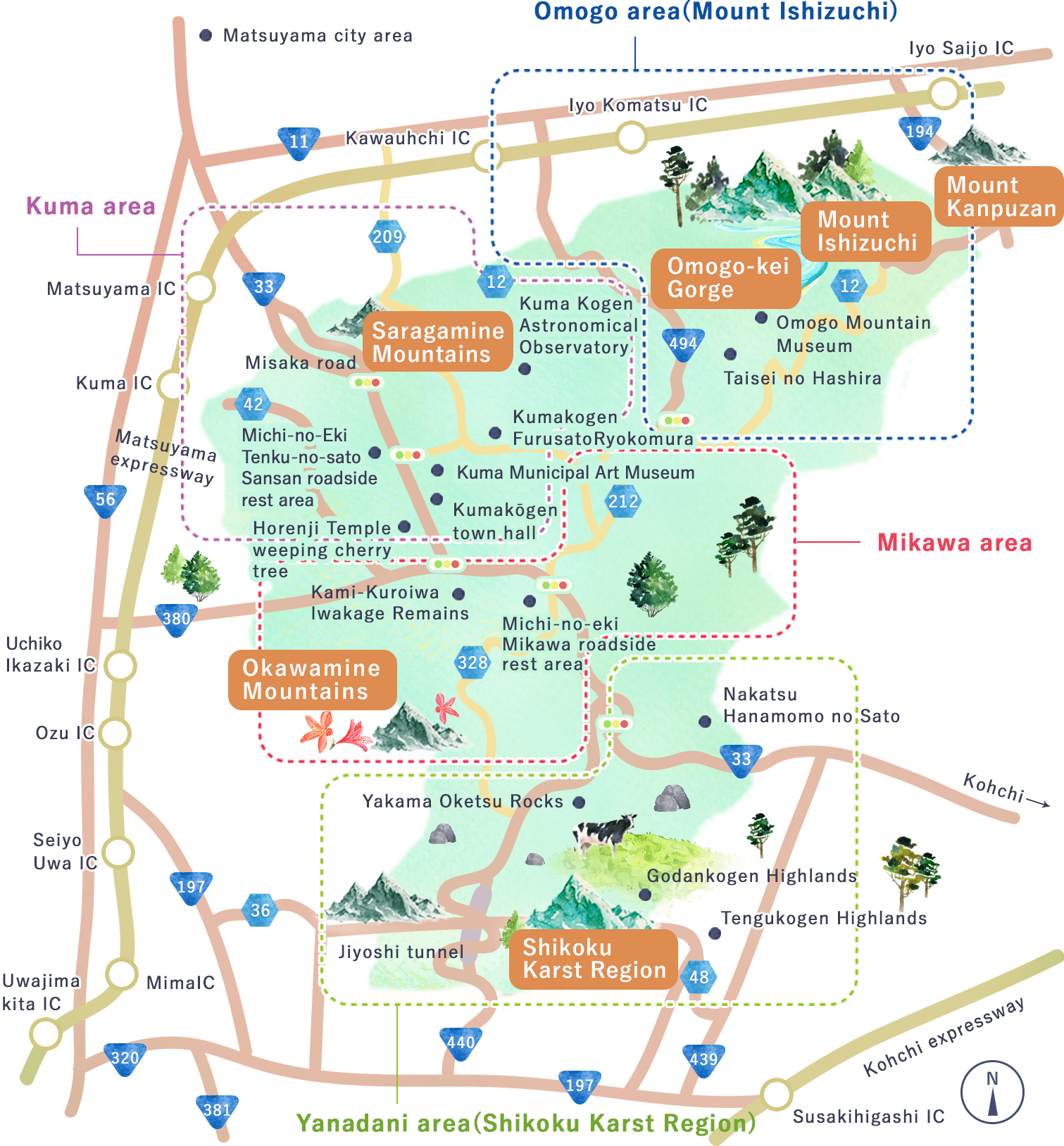
Kuma
Area
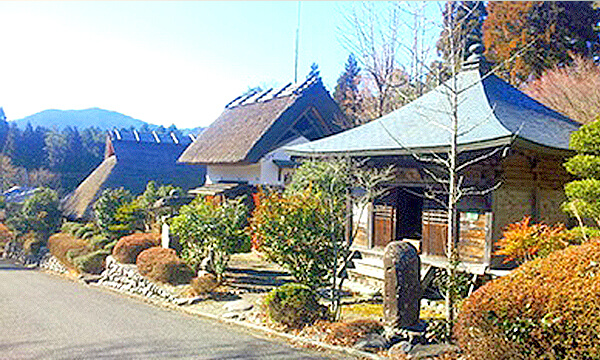
The central section of Kumakogen, where it takes about 30 minutes from MatsuyamaIC, Kuma is packed with cultural facilities including the Michi-no-eki Tenku-no-sato Sansan roadside rest area, Kumakogen Furusato Ryokomura, the Kuma Municipal Art Museum, the Kuma Kogen Astronomical Observatory and more. This area is also home to Daihoji Temple (the 44th temple on the Shikoku Pilgrimage) and its surrounding temple-town district, as well as local apple and grape picking/tasting facilities.
Omogo Area
(Mount Ishizuchi)
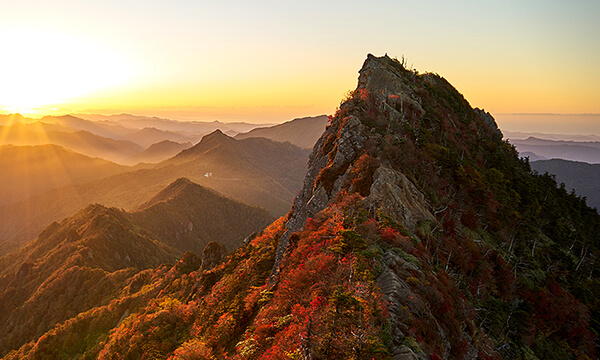
Towering at a height of 1,982 meters (6,503 feet), Mount Ishizuchi is Western Japan's tallest mountain and has been revered as a sacred spot since ancient times. The massive Omogo-kei Gorge—Shikoku's largest gorge—to the south of this mountain is home to pristine waters and a range of unusual rocks that form enchanting vistas. The entirety of Mount Ishizuchi is designated as a national park, and numerous visitors come in the autumn to see the area's beautiful changing leaves.
Mikawa
Area
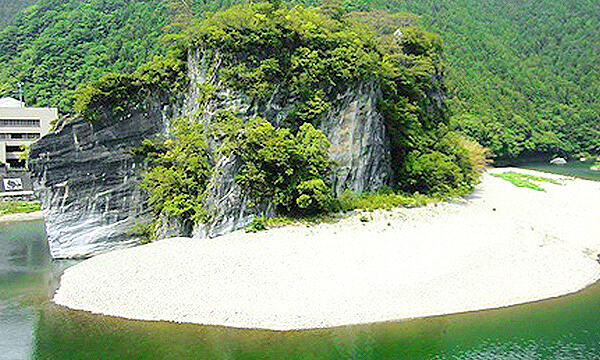
The symbolic Mimido-dake Rock stands at the convergence point of the Kumagawa River (whose source is at Misaka Pass) and the Omogo-gawa River (whose source is at Mount Ishizuchi). In addition to Iwayaji Temple, situated amidst the mystical Isoiwamine Mountains and serving as the 45th stop on the Shikoku 88-temple Pilgrimage, the Mikawa area is home to the Azogaike Pond featured in Nue legend, the Kami-Kuroiwa Iwakage Remains which serve as an important historical site for the Jomon Period (ca. 14,000–300 BCE), and numerous other ancient and historical spots imbued with an air of timeless wonder.
Yanadani Area
(Shikoku Karst Region)
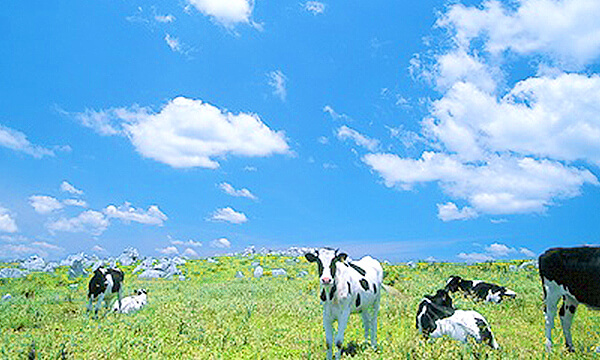
The impressive Shikoku Karst Region extends from east to west for roughly 25 kilometers (15.5 miles) along the Ehime–Kochi prefectural border at an elevation ranging from 1,000 to 1,500 meters (3,280 to 4,920 feet), and is ranked as one of Japan's top three karst regions, which are topographies characterized by limestone eroded into unique forms by rainwater. The Nakatsu district, famous for its Nakatsu Hanamomo no Sato, boasts a number of hands-on, community-promotion events where participants can experience life in the Shikoku countryside.
- Attractions
By Area
Overview of
the Kumakogen-cho
Tourism Association
- Logo
-
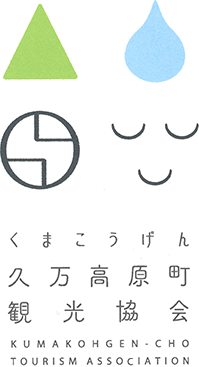
- Name
- the Kumakogen-cho Tourism Association
- Establishment
- April 27, 1985 (name changed from Kuma-cho Tourism Association to current name on June 22, 2005)
- Address
- 1855-6 Irino, Kumakogen-cho, Kamiukena-gun, Ehime Prefecture, 〒791-1201 [MAP]
- TEL
- 0892-21-1192
- Mission
- To carry out sound promotion of tourism industries and endeavors in the fields of both domestic and international tourism, foster greater convenience for visiting tourists, facilitate easy sightseeing trips to the local area, ensure safe and more fulfilling lives for local citizens, and contribute toward greater local prosperity through development, introduction and promotion of local tourism resources, maintenance of and improvements to sightseeing facilities, fostering high-quality tourism-industry professionals, and other such efforts in the town of Kumakogen-cho
- Primary Activities
- The Lodging Subcommittee, Agrotourism Subcommittee and Local Products Subcommittee each pursue their own activities
- Information for Visitors to Kumakogen


















